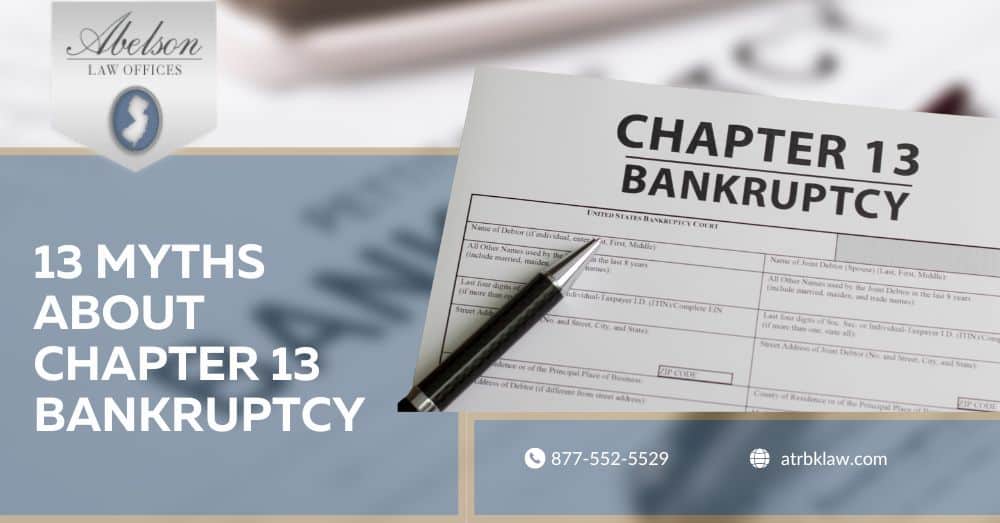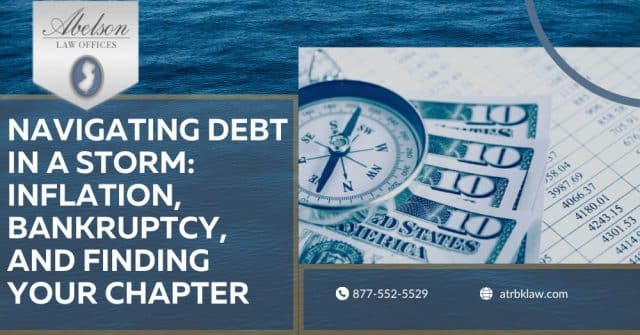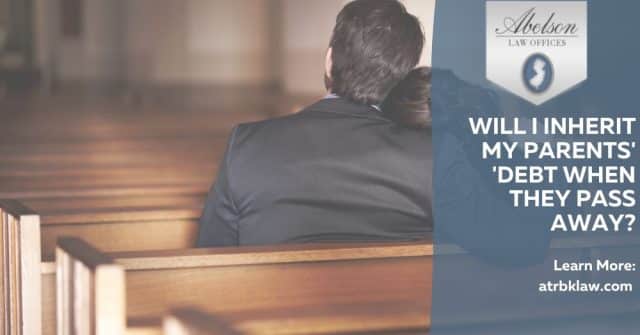There is a lot of information available online about Chapter 13 in the Bankruptcy Code, also known as the “Individual Repayment” option. It is not surprising that much of this information is biased or misleading. This article includes some of the fairly constant refrains we as bankruptcy lawyers hear from clients to explain their hesitancy to consider Chapter 13. It also aims to clarify and reassure people who may be considering this option or who deperately need its enhanced protections under the Bankruptcy code.
1. All my debts have to be repaid
No. There is no requirement in the Bankruptcy Code for full repayment of debts because of a Chapter 13 filing. Often, there is little or even zero paid to general unsecured (i.e. credit cards) in a 13 filing. The amount of the plan payment in a Chapter 13 depends on numerous factors, including the value of your assets and what they would derive after exemptions in a hypothetical Chapter 7 analysis; the amount of monthly disposable income based on the so-called “means test” and the existence or absence of priority debts such as tax obligations.
2. I will lose my house in Chapter 13
No. Quite to the contrary, a Chapter 13 is often utilized to save one’s home by providing a three to five year period to repay mortgage arrears. As long as the mortgage is paid current or provided for in the Chapter 13 plan, the house is secure. Sometimes, a second mortgage can even be eliminated in Chapter 13 through what is called a “strip off” procedure.
3. The creditors have to approve my Chapter 13 plan
No. As long a the criteria of the Bankruptcy Code for Chapter 13 plans are met, the creditors cannot prevent a proposed Chapter 13 plan from being confirmed by the Bankruptcy Court. While secured (i.e. mortgages or car loans) creditors can object if the plan does not properly address their claims, the ultimate decision rests with the Bankruptcy Judge based solely on the requirements of the Bankruptcy Code.
4. My credit will be destroyed worse than Chapter 7
No. A bankruptcy – irrespective of which chapter – is on your credit rating for ten
years following the date of the initial filing. While the bankruptcy “Discharge” is held in Chapter 13 until completion of the plan payments, the credit reporting runs from the date of filing. Furthermore, there are opportunities for additional credit even while in Chapter 13, although Court approval may be required for any substantial credit application.
5. I can’t afford to file Chapter 13
Misleading. The ultimate legal fee cost of a Chapter 13 is higher because of the
substantially increased work and time to process a Chapter 13 plan, but most attorneys will permit a good portion of those fees to be paid by the Bankruptcy Trustee from your Chapter 13 payments over the 3-5 year plan. Often, one pays less up front to file a Chapter 13 than a 7.
6. I can’t sell my house for five years
No. You can sell your house at any time. There are some added hoops because of the Chapter 13 as the Bankruptcy Court must ensure that your proceeds are distributed consistent with the Chapter 13 plan and that any professional working on your behalf is approved, but these are minor procedural issues and only in the rarest of circumstances would they actually prevent an actual sale.
7. After my payments, I won’t have enough money
Misleading. As noted above, payments are determined on numerous factors. The
concept of Chapter 13 is to pay to creditors the extra left-over monthly disposable income for the duration of the plan – but if that number is too high, a Chapter 7 Trustee would object anyway that the bankruptcy filing is an abuse of the Bankruptcy Code. While fairly convoluted, there are formulas that will match expense guidelines and normal monthly expenses in determining what
amount, if any, needs to be paid over to the Trustee for creditors. Most often, the expenses allowed are reasonable enough to cover all traditional expenses with even a little left over for miscellaneous or recreational expenses.
8. The Bankruptcy Trustee will oversee my life
No. The Trustee is not interfering with your everyday life. There will be a plan
established and approved in the beginning, and as long as the payments are faithfully made, it is most unlikely you will have any further dealing with the Bankruptcy Trustee in your plan. Only in cases where there are substantial change of circumstances along the way is there any real likelihood of additional Trustee scrutiny.
9. I am stuck in this plan for five years
No. One of the benefits of Chapter 13 is the easy ability to dismiss the bankruptcy
filing if things change down the road. This right is protected in the Bankruptcy Code, absent fraudulent conduct. Furthermore, the Chapter 13 plan can be modified along the way if necessary or the case can even be converted to Chapter 7 if necessary.
10. Most people don’t qualify for Chapter 13 anyway
Misleading. There are in fact debt limits to qualify for Chapter 13, but there are fairly high and only disqualify individuals in unusual circumstances. Individuals are eligible for chapter 13 relief as long as their combined total secured and unsecured debts are less than $2,750,000 (2023) as of the date of filing for bankruptcy relief. As long as you are an individual below the above limits, with regular income (even if from pension or social security and sometimes can even be by way of additional household contributions), and you have not had a prior bankruptcy discharge in four (4) years, you will qualify for filing 13.
11. It’s too complicated to file a Chapter 13
Misleading. Without question, a Chapter 13 involves substantially more paperwork and raises fairly complex legal issues so it is exceedingly difficult to file a successful Chapter 13 plan without an experienced bankruptcy lawyer. However, if the attorney has experience in this area of the law, he or she will know the law, the judicial practices in your particular vicinage and be able to successfully navigate the plan through conclusion.
12. There is too much paperwork required for Chapter 13
Misleading. The paperwork is not substantially greater than what an experienced
bankruptcy attorney would need to properly prepare a Chapter 7 petition. The issue that can be problematic is if the income is not verifiable as the Chapter 13 Trustee will insist on proving the monthly disposable income both as to ensure the feasibility of the Chapter 13 plan and that it conforms to the requirements of the Bankruptcy Code.
13. Chapter 13 is just a way for lawyers to charge more
No. Chapter 13 has tremendous benefits (many of which are not available in Chapter 7) and can be a life saver for many people. No reputable attorney, however would indiscriminately recommend a three to five year payment plan in Chapter 13 if not based on solid legal benefits obtained under these particular provisions of the Bankruptcy Code. The best way to ensure the best result for you and that it is fact necessary is to simply ask why a Chapter 13 is suggested and what are the specific legal reasons for that advice. Counsel should have no difficulty making that list for you.




